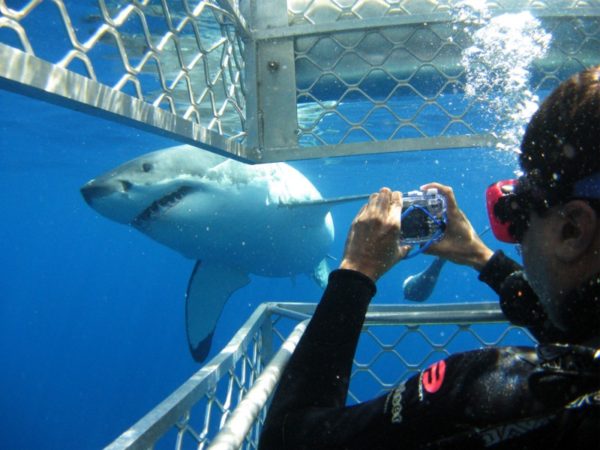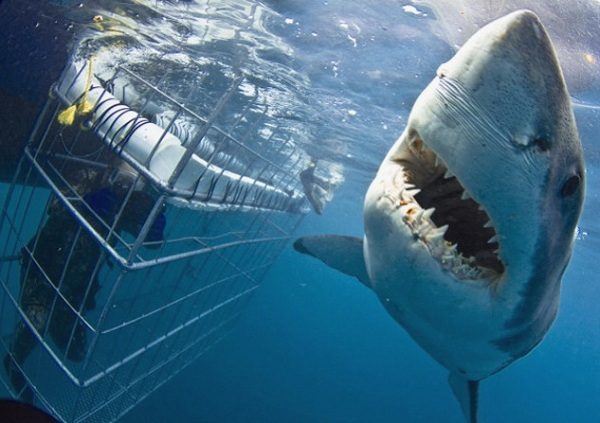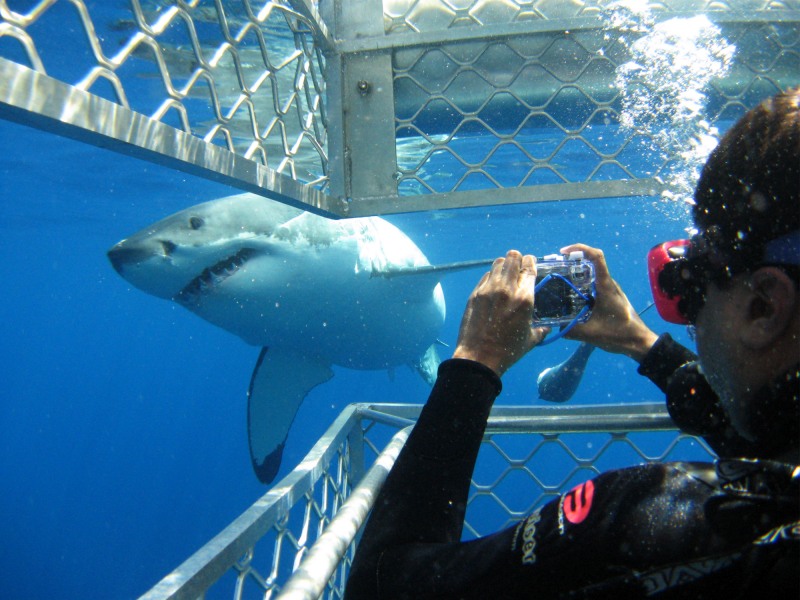In South Africa, the shark cage diving, especially with the White Shark is an upcoming new adventure, which is an aquatic equivalent of spotting the Mountain Gorilla in the natural habitat. This sport is not only adventurous, but is seriously thrilling and a genuinely distinct opportunity to get one-to-one with this great fish! In this article, you come to know more about the shark cage diving in South Africa.
Diving sites
There are three popular sites in the nation for shark cage diving: False Bay, Dyer Island, and Mossel Bay. For the experience at the False Bay that is near Cape Town, there are a few Great White Shark Diving Operators such as African Shark Eco Charters that offer 1 to 10 day trips. Here, less than four divers start the tour with 26 ft catamaran. Swimming with the predators is also possible from October to May. However, diving here requires the basic scuba certification that can be obtained here itself.

Dyer Island is regarded as the Great White Shark diving capital on Earth. Its water expanse from the Gansbaai at 100 m from Cape Town and the island is dubbed as ‘shark alley’. Gansbaai is also easily accessible from Hermanus (30 minutes) that is best known for whale-watching. Among the various tour operators here such as White Shark Ecoventures, White Shark Diving Company, and Shark Lady Adventures; you need to pick yours! The last two offers 4- and 2-people shark cage. If you choose Ecoventures, go for the most famous trip – one day tour for USD$185 per person that includes transport, boat trip, meals, cage diving, and spotting penguins, seals, and whales.
Mossel Bay is best with only one Great White Shark Diving Tour Operator – Shark Africa. With 10 people in 15 m catamaran and only 2 in the dive cage, this tour is just good for USD$130.
How to dive?
First of all, you need to reserve your adventurous trip with a reliable operator who will lead you via the boat to sea. Then, the boat crew will tempt the sharks by offering some good fish heads and livers, for reaching close to the boat. This way to allure the sharks is known as baiting. As the sharks swim around the boat, you make an attempt to jump in a dedicated diving cage. An Australian diver, Rodney Fox, has introduced this under water observation cage that is created from 12mm galvanized steel.

Qualifications for diving
A few diving operators insists that the shark cage divers must posses a basic level of diving experience. While on the boat, the dive master will tell you as to whether you can jump into the cage. Actually, it is snorkeling!
Concerns about shark cage diving
First, this diving is safe as it aims at surviving from the bite of a Great White Shark while yet permitting for a good vista of the shark. Worried about breathing? Well, the shark cages hold some special air tubes that soar up above the water surface. Therefore, you need to just stick on the tube for inhaling fresh air. Further, you will never be alone in the cage as it can hold several folks. Most of the cages can hold 2, 4, or 6 people making it possible for you to experience the sport with the whole family. Moreover, the cage floats very close to the surface and never descends deep down. This is because the sharks always feed on the surface. This removes your fear of being deep as in diving and that you can easily maintain he communication with the boat crew. And yes, getting out of the cage rapidly is as per your wish.
The best thing of the diving cage is that there is no need to know snorkeling or scuba diving. Actually, just snorkeling is okay for a majority of the dives, expect in the False Bay.
Best time
Winter is the time that is from May to October. However, it is not guaranteed to spot the sharks, but still the success rate until now is 95%. After all, no one can predict the sudden change in the weather. Summers also bring whales, but not in high numbers.
Duration
Most of the times, the dives last for 10 to 15 minutes. On top if the weather is conducive, you can enjoy more than one dive per day. Coming to the trips, each last for some 4 to 5 hours wherein the first 60 minutes is dedicated to finding the sharks and pulling them via bait.
